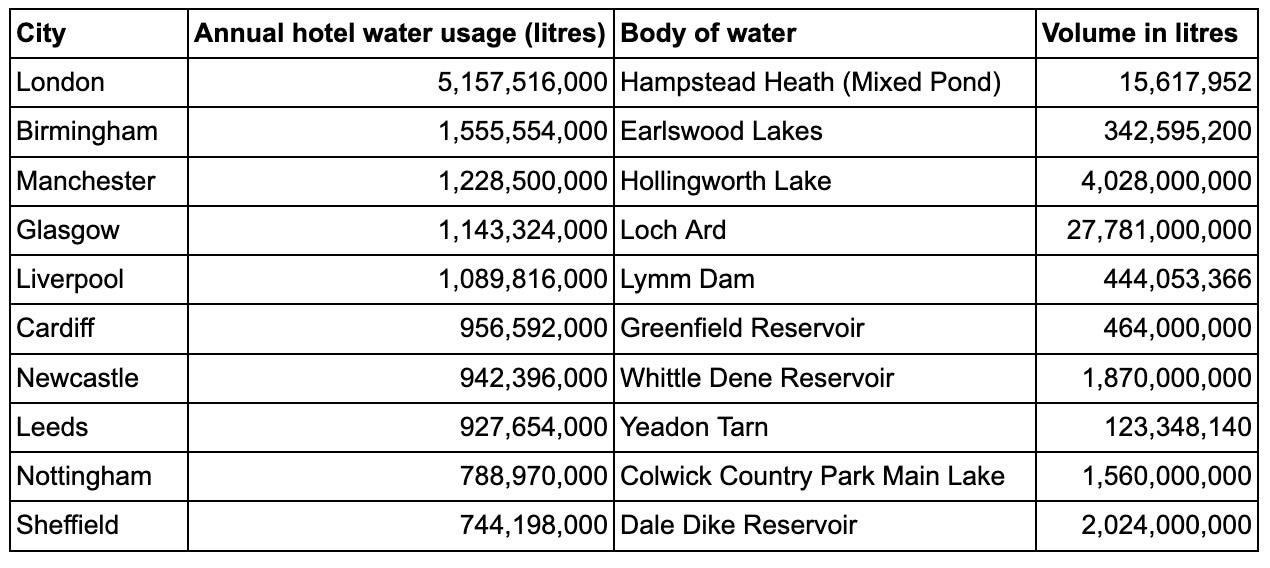New research reveals how much water hotels in the UK’s biggest cities used in the past year.
Providing a luxury guest experience means offering clean, crisp sheets, hot showers, and clean facilities, all of these elements rely on a vital resource: water. Recognising the significance of water consumption in the hospitality industry, commercial laundry cleaning experts at Oxwash conducted a comprehensive analysis of ten major hotels within the United Kingdom's most densely populated cities. The objective of this study was to estimate the water consumption of each city's hotel industry.
To establish a foundation for the analysis, Oxwash referred to the Sustainable Hospitality Alliance's assertion that a typical hotel consumes an average of 1,500 litres of water per room per day. Building upon this industry-standard metric, the study involved meticulous research to ascertain the number of rooms within a sample of hotels in each city. This crucial information served as the basis for calculating the annual water consumption of these hotels within the respective cities.
Oxwash then compared this to some famous bodies of water within each location to help business and consumers understand the scale of usage.

Nestled within the bustling metropolis of London, major hotels collectively consumed a staggering 5,157,516,000 litres of water annually. To put this colossal figure into perspective, it's equivalent to filling Hampstead Heath's Mixed Pond more than 300 times over.
In Birmingham, hotels annually utilised 1,555,554,000 litres of water, a substantial resource. This vast quantity of water could fill the picturesque Earlswood Lakes four and a half times over.
Moving to Manchester, the city's hotels are significant contributors to its water consumption, accounting for 1,228,500,000 litres each year. This prodigious figure is enough to replenish the entirety of Hollingworth Lake, a cherished local landmark, in only 3 years.
Glasgow hotels consume 1,143,324,000 litres of water annually. If they continue to use water at this rate they would be able to fill the entirety of Loch Ard in 25 years.
Turning attention to Liverpool, hotels collectively utilise 1,089,816,000 litres of water on an annual basis. This substantial water demand translates to filling Lymm Dam, a picturesque reservoir in the vicinity, twice in one year.
Cardiff's hotels are significant consumers of water, accounting for 956,592,000 litres annually. To put this into perspective, it would fill the scenic Greenfield Reservoir located nearby twice over the course of a single year.
In Newcastle, the annual water usage of hotels is estimated at 942,396,000 litres. Over the course of the year this quantity of water could fill Whittle Dene Reservoir, a vital regional water source, approximately two and a half times.
Moving on to Leeds, the hotels in this city annually consume 927,654,000 litres of water. This substantial volume of water could fill the entirety of Yeadon Tarn seven times over.
Nottingham's hotels have a combined annual water usage of 788,970,000 litres. To put this into perspective, this quantity of water could fill Colwick Country Park Main Lake in less than two years.
Finally, in Sheffield, hotels collectively consume 744,198,000 litres of water each year. This substantial amount would fill Dale Dike Reservoir, a significant local water source, in less than three years.
The statistics unveiled by Oxwash's comprehensive analysis of the UK's hotel industry water consumption underscore a looming crisis. Government figures reveal that, in England alone, a staggering 18% of rivers and reservoirs have more water extracted from them than replenished—an unsustainable trend that threatens natural water sources.
What makes these numbers even more alarming is the stark warning issued by the Environment Agency just two years ago, suggesting that the UK could face water shortages by 2050 if decisive action isn’t taken to conserve water supplies. These statistics paint a vivid picture of the urgency to address the hotel industry's water consumption practices. It's not just about luxury; it's about the responsible and sustainable use of a resource that's increasingly scarce. Oxwash's findings serve as a wake-up call for businesses and consumers alike, to embrace eco-conscious practices and safeguard water resources for future generations.
Dr Kyle Grant from Oxwash offered insights on the study, remarking, "The hotel industry in each of the UK's major cities collectively consumes a staggering 38,652,614,658 litres of water annually. This data serves as a resounding call for the hotel sector to embrace sustainability in water management. Beyond the environmental imperatives, there are significant financial ramifications tied to wasteful practices. It's imperative for the industry to prioritise sustainability by implementing best practices, optimising water consumption, and recognising that unsustainable processes not only harm the environment but also jeopardise long-term financial viability. By championing responsible water management, hotels can reduce costs, promote environmental stewardship, and secure a more sustainable future for all."